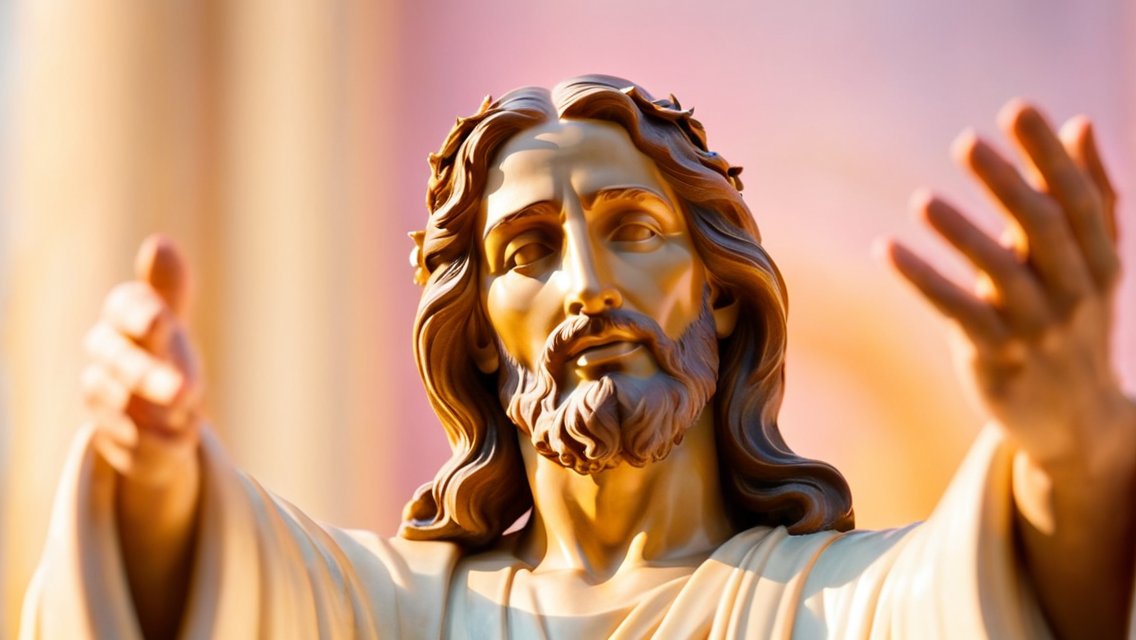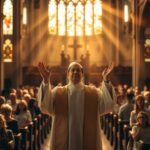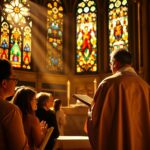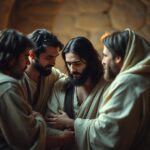Welcome to this sacred reflection for the Second Sunday of Easter, celebrated throughout the Church as Divine Mercy Sunday—a day overflowing with hope, healing, and the boundless love of our risen Lord.
In the shadow of the Resurrection, Jesus comes to us not with judgment, but with wounds that speak of mercy. He meets His disciples behind locked doors, not to rebuke, but to breathe peace upon them. This Sunday is a powerful reminder that no sin is too great, no heart too broken, and no soul too lost for the mercy of God.
Instituted by Saint John Paul II, Divine Mercy Sunday invites us to plunge into the ocean of Jesus’ mercy, revealed so profoundly to St. Faustina Kowalska. Through the image of the Divine Mercy, the Chaplet, and the prayer, “Jesus, I trust in You,” we are called to surrender our fears and failures to the One whose heart was pierced for us.
As we reflect together on today’s Gospel, we open ourselves to the gift of forgiveness and the mission to be merciful as the Father is merciful. Whether you are seeking comfort, peace, renewal, or simply a deeper experience of faith—may these words draw you closer to the heart of Jesus, who is Mercy itself.
In today’s readings, we witness the early Church’s vibrant faith, the awe-inspiring visions of John in Revelation, and the tender encounter between the risen Christ and Thomas. These passages illuminate the journey from doubt to belief, fear to peace, and isolation to community.
As we meditate on these scriptures, we’re reminded that faith isn’t merely an abstract concept but a lived experience that brings healing, unity, and purpose. The Divine Mercy of Jesus assures us that no wound is too deep, no doubt too great, and no sin too severe to be beyond the reach of His love.
May this reflection inspire you to open your heart to the endless mercy of Christ and to walk confidently in faith, knowing that His grace is ever-present and transformative.
Acts 5:12-16 Rev1:9-13, 17-19 Jn 20:19-31
The Meaning, Wonder, and Result of Faith
How Much Can We Learn From Experience?; Making Real the Power of the Resurrection; The Presence of the Risen Jesus.

1st Reading – Acts 5:12-16
12 Many signs and wonders were done among the people at the hands of the apostles. They were all together in Solomon’s portico.
13 None of the others dared to join them, but the people esteemed them.
14 Yet more than ever, believers in the Lord, great numbers of men and women, were added to them.
15 Thus they even carried the sick out into the streets and laid them on cots and mats so that when Peter came by, at least his shadow might fall on one or another of them.
16 A large number of people from the towns in the vicinity of Jerusalem also gathered, bringing the sick and those disturbed by unclean spirits, and they were all cured.
Responsorial Psalm – Psalms 118:2-4, 13-15, 22-24
R. (1) Give thanks to the LORD, for he is good, his love is everlasting.
or:
R. Alleluia.
2 Let the house of Israel say,
“His mercy endures forever.”
3 Let the house of Aaron say,
“His mercy endures forever.”
4 Let those who fear the LORD say,
“His mercy endures forever.”
R. Give thanks to the LORD, for he is good, his love is everlasting.
or:
R. Alleluia.
13 I was hard pressed and was falling,
but the LORD helped me.
14 My strength and my courage is the LORD,
and he has been my savior.
15 The joyful shout of victory
in the tents of the just:
R. Give thanks to the LORD, for he is good, his love is everlasting.
or:
R. Alleluia.
22 The stone which the builders rejected
has become the cornerstone.
23 By the LORD has this been done;
it is wonderful in our eyes.
24 This is the day the LORD has made;
let us be glad and rejoice in it.
R. Give thanks to the LORD, for he is good, his love is everlasting.
or:
R. Alleluia.
2nd Reading – Revelation 1:9-11A, 12-13, 17-19
9 I, John, your brother, who share with you the distress, the kingdom, and the endurance we have in Jesus, found myself on the island called Patmos
because I proclaimed God’s word and gave testimony to Jesus.
10 I was caught up in spirit on the Lord’s day and heard behind me a voice as loud as a trumpet,
11A which said, “Write on a scroll what you see.”
12 Then I turned to see whose voice it was that spoke to me, and when I turned, I saw seven gold lampstands
13 and in the midst of the lampstands one like a son of man, wearing an ankle-length robe, with a gold sash around his chest.
17 When I caught sight of him, I fell down at his feet as though dead. He touched me with his right hand and said, “Do not be afraid. I am the first and the last,
18 the one who lives. Once I was dead, but now I am alive forever and ever. I hold the keys to death and the netherworld.
19 Write down, therefore, what you have seen, and what is happening, and what will happen afterwards.”
Alleluia – John 20:29
R. Alleluia, alleluia.
29 You believe in me, Thomas, because you have seen me, says the Lord;
Blessed are those who have not seen me, but still believe!
R. Alleluia, alleluia.
Gospel – John 20:19-31
19 On the evening of that first day of the week, when the doors were locked, where the disciples were, for fear of the Jews, Jesus came and stood in their midst and said to them, “Peace be with you.”
20 When he had said this, he showed them his hands and his side. The disciples rejoiced when they saw the Lord.
21 Jesus said to them again, “Peace be with you. As the Father has sent me, so I send you.”
22 And when he had said this, he breathed on them and said to them, “Receive the Holy Spirit.
23 Whose sins you forgive are forgiven them, and whose sins you retain are retained.”
24 Thomas, called Didymus, one of the Twelve, was not with them when Jesus came.
25 So the other disciples said to him, “We have seen the Lord.” But he said to them, “Unless I see the mark of the nails in his hands and put my finger into the nail marks and put my hand into his side, I will not believe.”
26 Now a week later his disciples were again inside and Thomas was with them. Jesus came, although the doors were locked, and stood in their midst and said, “Peace be with you.”
27 Then he said to Thomas, “Put your finger here and see my hands, and bring your hand and put it into my side, and do not be unbelieving, but believe.”
28 Thomas answered and said to him, “My Lord and my God!”
29 Jesus said to him, “Have you come to believe because you have seen me? Blessed are those who have not seen and have believed.”
30 Now Jesus did many other signs in the presence of his disciples that are not written in this book.
31 But these are written that you may come to believe that Jesus is the Christ, the Son of God, and that through this belief you may have life in his name.
Moral Story: “The Broken Crutch”
In a quiet village, lived a beggar named Elias who had a broken wooden crutch and a heart full of doubt. Every day, he sat near the church gate and asked for alms, all the while mocking those who prayed inside. “If your God is real,” he’d say, “why am I still crippled and poor?”
One stormy evening, an old priest passed by and handed Elias a small cross made of olive wood. “Hold on to faith,” he whispered. “Even broken things can become whole in the hands of Jesus.”
That night, Elias dreamed he was standing—no crutch, no pain—before Jesus. The Lord touched his shoulder and said, “Your faith, even as small as a seed, has not gone unnoticed.”
Elias awoke, and though his leg was still weak, something in him had changed. He began to pray daily, help others in need, and speak of the mercy of Jesus. Months later, a traveler gifted him a new crutch and offered him work. Slowly, he walked again—not just on his feet, but in faith.
The villagers no longer saw a beggar. They saw a testimony.
Moral: Faith does not always remove the storm, but it teaches us to walk through it, and divine mercy makes us whole from within.
10 Bible Verses on Faith and Divine Mercy
-
Ephesians 2:8 – “For by grace you have been saved through faith, and this is not your own doing; it is the gift of God.”
-
Hebrews 11:1 – “Now faith is the assurance of things hoped for, the conviction of things not seen.”
-
Lamentations 3:22-23 – “The steadfast love of the Lord never ceases; his mercies never come to an end; they are new every morning.”
-
Mark 11:24 – “Therefore I tell you, whatever you ask in prayer, believe that you have received it, and it will be yours.”
-
Titus 3:5 – “He saved us, not because of righteous things we had done, but because of his mercy.”
-
Romans 5:1 – “Therefore, since we have been justified through faith, we have peace with God through our Lord Jesus Christ.”
-
Psalm 103:10-11 – “He does not treat us as our sins deserve or repay us according to our iniquities.”
-
Matthew 17:20 – “If you have faith as small as a mustard seed… nothing will be impossible for you.”
-
1 Peter 1:3 – “In his great mercy he has given us new birth into a living hope through the resurrection of Jesus Christ.”
-
2 Corinthians 5:7 – “For we walk by faith, not by sight.”
10 Religious Jokes on Faith and Divine Mercy
-
Why did the mustard seed go to seminary?
It had faith it could grow into something great! -
What did Jesus say to the Wi-Fi?
“Have faith, I’m always connected.” -
Why don’t churches ever have good Wi-Fi?
Because faith should never be based on what you see! -
What do you call it when God gives you what you don’t deserve?
Divine mercy. What do you call it when He doesn’t give you what you do deserve? Even more mercy! -
Why did the Christian bring a ladder to church?
To climb in faith! -
What’s God’s favorite workout?
Faith lifts. -
Why didn’t the sinner get a speeding ticket?
Because mercy triumphs over judgment! -
What do you get when you cross a doubter with a disciple?
Someone who believes… eventually. -
Peter walked on water until he looked down—what’s the moral?
Keep your eyes on Jesus, not your feet! -
Why did the angels take a break?
Even mercy needs coffee sometimes!
10 Quotes from Great People on Faith and Mercy
-
Mother Teresa – “Faith in action is love—and love in action is service.”
-
Pope Francis – “Mercy is the beating heart of the Gospel.”
-
Martin Luther King Jr. – “Faith is taking the first step even when you don’t see the whole staircase.”
-
St. Augustine – “Faith is to believe what you do not see; the reward of this faith is to see what you believe.”
-
Billy Graham – “God’s mercy and grace give me hope—for myself, and for our world.”
-
Corrie Ten Boom – “There is no pit so deep that God’s love is not deeper still.”
-
C.S. Lewis – “I believe in Christianity as I believe that the sun has risen: not only because I see it, but because by it I see everything else.”
-
St. John Paul II – “Do not be afraid. Open wide the doors to Christ.”
-
Helen Keller – “Faith is the strength by which a shattered world shall emerge into the light.”
-
Max Lucado – “Faith is not the belief that God will do what you want. It is the belief that God will do what is right.”
Homily
Some teachers of creative art say that what an artist needs is experience, despite the fact that the class colours of the school of experience are black and blue. Artists are t live it up, see all of the world they can, and do everything to awaken dormant emotions. All experiences, including participation in evil, are valid and good – with the sole exception of death, which people who hold these positions greatly fear, because death is the one personal experience that no one can have twice. Contrary to many other teachers of acting, Stella Adler didn’t advise the accumulation of experiences to fall back upon – such as recalling the death of your mother when you wanted to look sad. “Don’t use4 your conscious past,” she advised her student-actors. “Use your imagination to create a past that belongs to your character. I don’t want you to be stuck with your own life. It’s too little.”
St Thomas in today’s Gospel showed his high regard for experience when he refused to believe in the risen Jesus without probing his nail-marks and putting his hand into his side (v. 25). We may “see” mirages which don’t exist; we might “hear” sounds which aren’t there; likewise, all of our other senses can deceive. But when we touch something, we know it’s there. That’s why some call touch the sense of certitude.
Jesus accommodated himself to Thomas’ make-up. The result was the most profound profession of faith in the New Testament: Thomas’, “My Lord and my God”. More than an exclamation, these words are a prayer acknowledging Jesus’ divinity.
The experience of the risen Jesus by the Apostles, especially doubting ones like Thomas, is the basis for the whole of Christianity. But there are dangerous in too high a regard for experience. Jesus reminded Thomas of that in his beatitude, “Blessed are those who have not seen and have believed” (v. 29). If we believe that the verification principle of all of life is only what we can experience, the vast majority of us can’t believe in God or anything supernatural.
St John in his Book of Revelation, from which we have today’s Second Reading, received images from experience and then built upon them in this, his dream. Another title of this book, Apocalypse, means an unveiling, a glimpse at hidden things, things yet to come. Apocalypse, a special type of Jewish literature, are more common in the Old Testament. They’re not easy to understand. They often use the images of dreams. They were usually written to give encouragement to groups who were suffering persecution; such victims would easily have groups who were suffering persecution; such victims would easily have decoded the underlying message of comfort. The ultimate consolation is that Jesus will absolutely and irrevocably conquer, and we shall share in his victory if we are faithful to him. This apocalypse of John was just such a message to the young Christian churches, which at that time were beginning to feel the brunt of persecution.
The book’s author, John – who may or may not be the same person who wrote St John’s Gospel – wrote this work from exile on Patmos, a small rock island off the coast of modern Turkey. Rome had sent John there to the loneliness and pain of banishment because he was bearing witness to Jesus. John wrote essentially to console those who were suffering for their faith by reminding them that Jesus would absolutely and decisively conquer.
The hills of Patmos provide beautiful views of the glistening blue sea, and John’s book is full of the broad vistas of the far-stretching water. The word sea occurs in this book no less than twenty-five times. John used other symbolism – in colours, numbers, images, and language – from his intimate knowledge of the Jewish Scriptures as well as from his own experience. Parts of it we understand, others not. It is the most difficult book of the New Testament.
John introduces himself as a brother who shares with all reborn Christians distress and endurance (v. 9). He shares our distress because people won’t listen to someone who speaks of hardship from the comfort of an easy chair. He mentions endurance because he knows that the person who sits with bowed head in passive submission to whatever comes is not real.
For nineteen centuries John’s vision of the end of the world has shaken the imagination of Western humankind. John’s nightmare imagery has infused our art from the medieval representations of the Last Judgement, through the desolate horrors of Hieronymus Bosch, the poetry of William Blake, and the fiction of Herman Melville, to today’s doomsday evangelists and apocalyptic movies.
John tells us he was caught up in ecstasy (v. 10) – beyond space and time. He heard God’s voice, which sounded like a trumpet. Through that comparison, like every other comparison of this world to the heavenly world, is inadequate, both the Old and New Testaments often compare the voice of God to the commanding clarity of the trumpet. Examples are many. The account of God’s giving the Law on Mt. Sinai says that amid peals of thunder and lightning there was a very loud trumpet blast, so that all the people in the camp trembled (Ex 19:16). when Jesus spoke of his hard-to-imagine Second Coming, he said that God would send out his angels with a trumpet blast to gather His elect from one end of the heavens o the other(Mt 24:31). And St Paul said that at Jesus’ Second Coming the Lord himself with the trumpet of God will come down from heaven (1 The 4:16).
John goes on (v. 12-16) to give a symbolic description of Christ in glory. He is “One like a Son of Man” – an enigmatic First Testament (Dan 7:13) title of Christ. Jewish apocalyptic literature used the title to describe a unique religious personage endowed with extraordinary spiritual power. Jesus used it frequently of himself. It was well adapted to his purpose to both veil and reveal his person and mission. On the one hand, it emphasized the lowliness of the human condition, especially in Jesus’ humiliation and death; on the other hand, it expressed the triumph of Jesus’ resurrection which we celebrate through this Easter season, his return to glory, and his Second Coming as judge of the world.
When John – and the Church in this Easter season – sees most is Jesus’ glory. The combination of awe and fear caused in John the usual reaction of people before God or before a messenger of God – He fell down at his feet (v. 17). When there was such a great catch of fish that Peter the Fisherman finally got a glimpse of who Jesus was, he had fallen at Jesus’ Knees. The disciples had heard Jesus’ calm reassurance against fear on more than one experience – defying and imagination challenging occasion – when he had come to them across the water, for example, and on the Mount of Transfiguration.
Then John heard Jesus give nothing less than God’s description of Himself: “I am the First and the Last, the One who lives” (vv. 17f,; see Is 44:6; 48:12). These awesome titles synthesize the three stages in Jesus’ career – his pre-existence, his life and death on earth, and his exaltation to eternal life. Jesus went on to give John the sublime revelation: “Once I was dead but now I am alive forever and ever” (v. 18). This is the core of the Christian creed. It is the claim of one who has risen from the dead, is alive forever, and has conquered death so that he is death’s master. Because Jesus lives, we too shall live.
Faith in these truths of Jesus’ resurrection bears many fruits, one of which is our common life as described in today’s First Reading. It is the third summary portrait in the Acts of the Apostles, admittedly idealistic, of the Jerusalem community, creating an atmosphere of peace and fulfillment, but also of fear. God gave the early Christians the signs and wonders they needed as saving actions to spread the Good News. Among them were the Twelve’s charismatic power to heal, such that the people carried their sick out into the streets so that when Peter came by at least his shadow might fall on one or another of them (v. 15), and crowds from the towns in the vicinity of Jerusalem also brought their sick, and they were all cured (v. 16). Now that Jesus has returned to the Father after curing a few people, the disciples seem to be doing even greater things than he!
But all of this provided also a note of fear – in those who didn’t dare join the early Christian community in Jerusalem, fear in those within the community who were undergoing persecution for Jesus’ sake, fear in the very first disciples huddled behind locked doors Such fear can be, and is, overcome in the Spirit of Christ.
Fear remains a very real issue in our world – fear of illness, of poetry, of loss of relationships, of humiliation, of loss of employment, of death. If we truly believe in Jesus’ Good News, though, fear is expelled. The essence of the good News, as we recall in the Easter Season, is that Jesus has conquered death. This victory over humankind’s last enemy is a conquest for everyone. What is there to fear from any of the others?
We are among those to whom Jesus says “Blessed are those who have not seen and have believed.” We go beyond experience to be no less moved by this Easter Season than were John the Theologian and Thomas. The encounter, far from being tame, confronts us to the core of our being. We pray for deeper awareness of the blessings of Christ’s resurrection and our consequent new birth in God’s Spirit.









